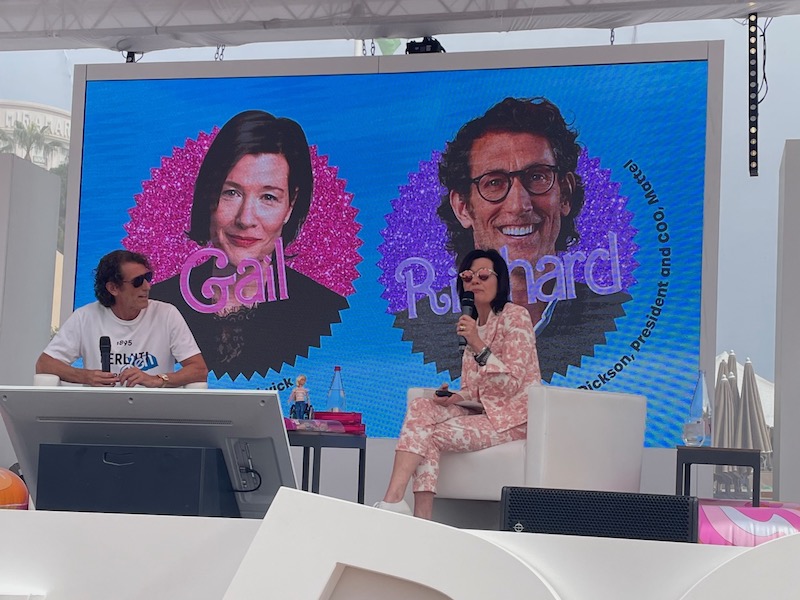Maja Pawinska Sims 27 Jun 2023 // 9:50PM GMT

CANNES — In advance of the much-hyped Barbie movie hitting cinemas this summer, Mattel president and COO Richard Dickson spoke on the Cannes Lions festival fringe about the purpose-driven renaissance of the company’s iconic doll brand.
In conversation on the Inkwell Beach (pictured), Dickson told Gail Heimann, CEO of Barbie’s PR agency Weber Shandwick, that the brand team had taken a “long hard look in the mirror” in 2015, when sales and consumer favourability had plummeted and CNN ran a headline asking: “Is Barbie Dead?”
Dickson – whose role includes design and development, brand marketing and innovation strategy – said at that time, Barbie had lost sight of its own origin story. “Barbie was introduced in 1959, designed by Mattel co-founder Ruth Handler, who saw her daughter Barbara playing with dress-up paper dolls and wanted to ‘inspire a limitless world of possibilities for girls’.
“But 2015 was a tough year. The business was declining and the love affair with Barbie was waning. Our studies showed moms and girls didn’t feel like Barbie related to them anymore. We took those insights and dealt with the truth, moving from a monologue to a dialogue with consumers.”
The brand’s response was to focus on diversity and inclusion, transforming the limited doll range into a “mirror image of the real world,” with 22 ethnicities and skin tones and nine different body types; the range now includes 175 different Barbies.
Barbie’s latest diverse iterations embrace physical disability, including the launch this year of a doll with Down syndrome, as well as a doll in a wheelchair, one with a hearing aid, and another with a prosthetic limb.
Speaking at another Cannes fringe event with his marketing and PR partners, the annual IPG Inclusion Breakfast, Dickson said: “We start every conversation with: what is our purpose? It's to inspire the limitless potential of girls and women. Barbie has come a long way – we have become more aware of the challenges girls face, whether their identity or abilities, and ensure every girl can see themselves through an inclusive, diverse line.
“As we evolve as a company, it’s important to leave the world better than we found it and continue to ensure that kids see role models through what we do. It is a cultural conversation and using that as a platform for good. The 65th year of the Barbie brand represents more than play: it’s driving innovation through consideration of diversity.”
The brand has underpinned its evolution of Barbie with scientific research, supported by Weber Shandwick, which found playing with dolls can help children’s social development and empathy.
Under Dickson’s leadership, the company has also developed the Mattel Playbook, a brand-building approach that has been instrumental in driving the turnaround and growth of Mattel’s biggest brands; in 2022, Barbie was the number one doll in the world, with revenue hitting $1.7 billion.
On the Inkwell stage, Heimann asked Dickson what advice he would give to marketers in the current global environment. He said: “From a trends perspective we are in permacrisis, it’s heavy. When brands are trying to reach consumers now, evolution makes a brand relevant, but purpose keeps a brand immortal. When it has a greater meaning than the product, it can be sustained for generations, because it matters.
“We are mass marketers, but we’re moving from mass marketing to mass 'mattering'; that twist personifies the importance of what we do in the world. Driving purpose in your organisation is the best advice I can give.”



































.jpg)

















